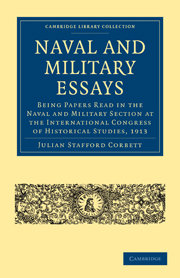 Naval and Military Essays
Naval and Military Essays Book contents
- Frontmatter
- PREFACE
- Contents
- A—NAVAL
- B—MILITARY
- THE DIFFICULTIES ENCOUNTERED IN COMPILING MILITARY HISTORY
- THE VALUE OF THE STUDY OF MILITARY HISTORY AS TRAINING FOR COMMAND IN WAR
- THE PRACTICAL APPLICATION OF MILITARY HISTORY
- PRÉCIS OF THE PLANS OF NAPOLEON FOR THE AUTUMN CAMPAIGN OF 1813
- THE INFLUENCE OF TACTICAL IDEAS ON WARFARE
- FIELD-MARSHAL PRINCE SCHWARZENBERG: A CHARACTER SKETCH
- A DEFENCE OF MILITARY HISTORY
- FOREIGN REGIMENTS IN THE BRITISH SERVICE, 1793-1815
- INDEX
THE PRACTICAL APPLICATION OF MILITARY HISTORY
Published online by Cambridge University Press: 07 September 2010
- Frontmatter
- PREFACE
- Contents
- A—NAVAL
- B—MILITARY
- THE DIFFICULTIES ENCOUNTERED IN COMPILING MILITARY HISTORY
- THE VALUE OF THE STUDY OF MILITARY HISTORY AS TRAINING FOR COMMAND IN WAR
- THE PRACTICAL APPLICATION OF MILITARY HISTORY
- PRÉCIS OF THE PLANS OF NAPOLEON FOR THE AUTUMN CAMPAIGN OF 1813
- THE INFLUENCE OF TACTICAL IDEAS ON WARFARE
- FIELD-MARSHAL PRINCE SCHWARZENBERG: A CHARACTER SKETCH
- A DEFENCE OF MILITARY HISTORY
- FOREIGN REGIMENTS IN THE BRITISH SERVICE, 1793-1815
- INDEX
Summary
I hope that this meeting will not consider that I am claiming too much when I say that Military History should be the most constructive branch of what is essentially a constructive science. If he is to do any real good the teacher of Military History must have his thoughts permanently fixed upon the future. In that way only can he turn such knowledge as he possesses to a useful end.
If this is true of Military History as a whole, it is more particularly true of that part of it which deals with tactics—the part upon which I propose to touch to-day. Strategy has a few permanent principles, of which the most important is that it should enable a commander to bring more men on to the field of battle than his opponent. Tactics, I think, have only one principle, and that is that men should be so handled that they can use whatever weapons they possess to the best advantage. Assuming that soldiers of all armies are equally well trained, and animated by equally high courage, the art of the general will consist in so handling his men that they can use their weapons to greater effect than can their opponents. The question is, how can this art be learnt? The answer is, from experience or from history. In practice it is usually learnt from history corrected by more or less bitter experience.
- Type
- Chapter
- Information
- Naval and Military EssaysBeing Papers read in the Naval and Military Section at the International Congress of Historical Studies, 1913, pp. 148 - 155Publisher: Cambridge University PressPrint publication year: 2009First published in: 1914


